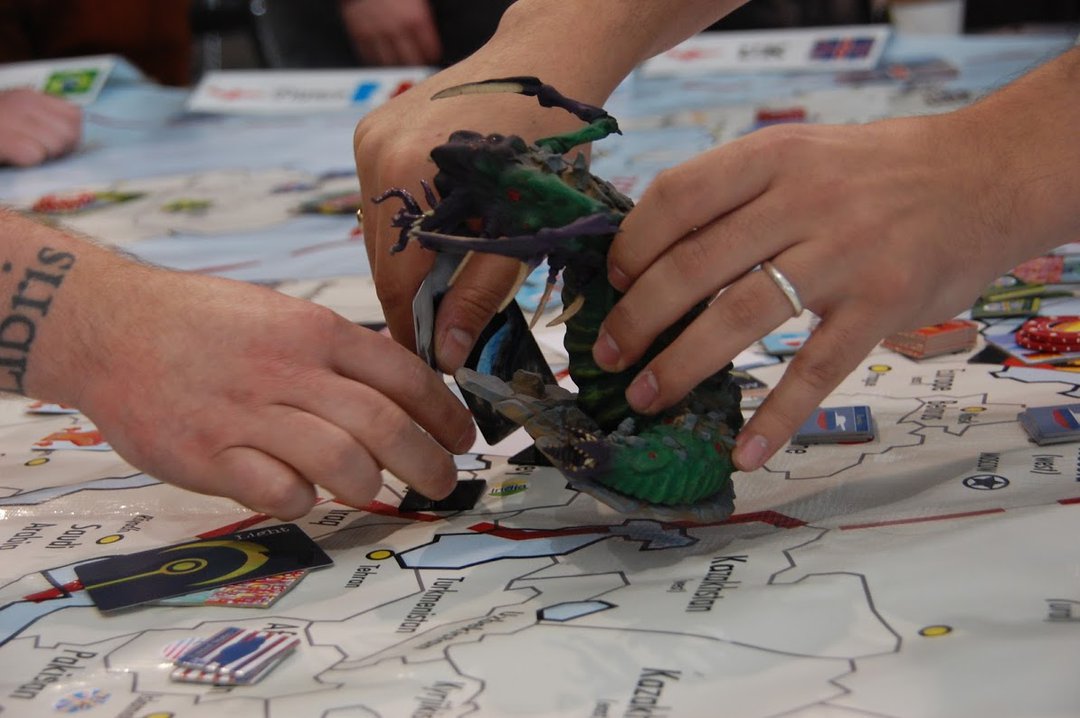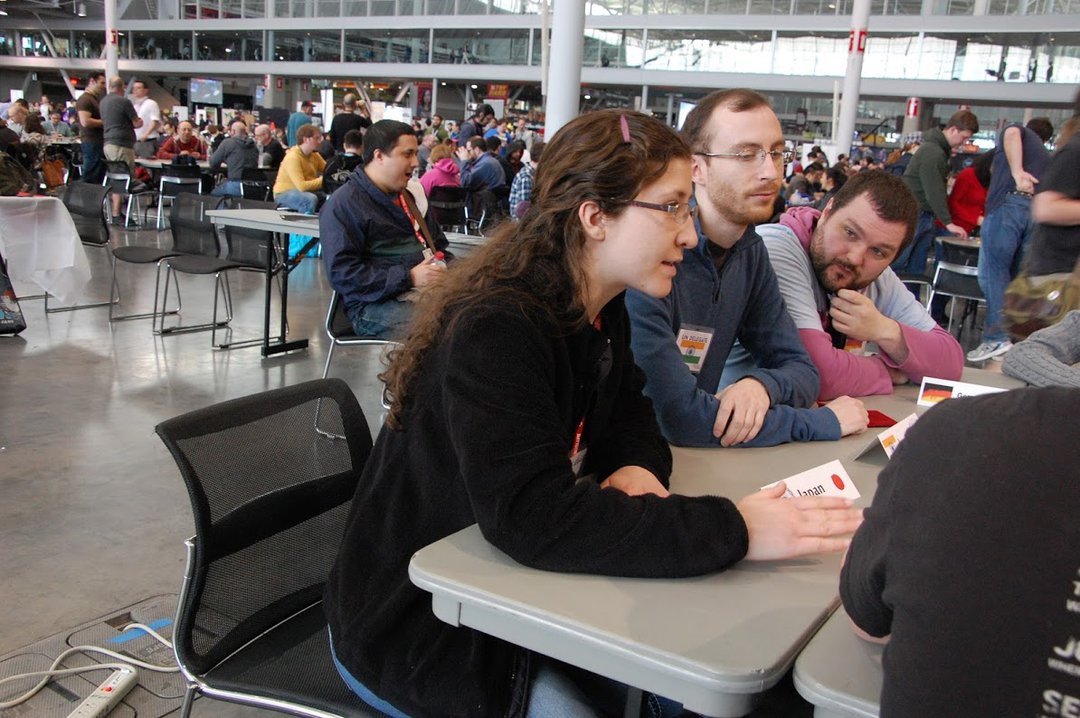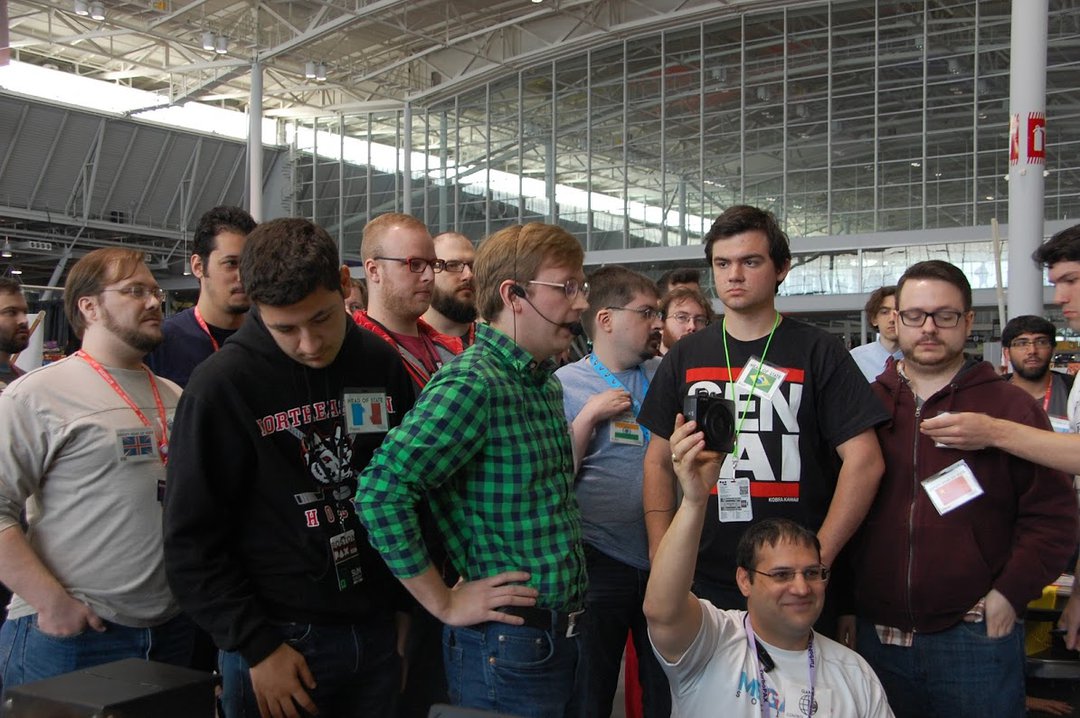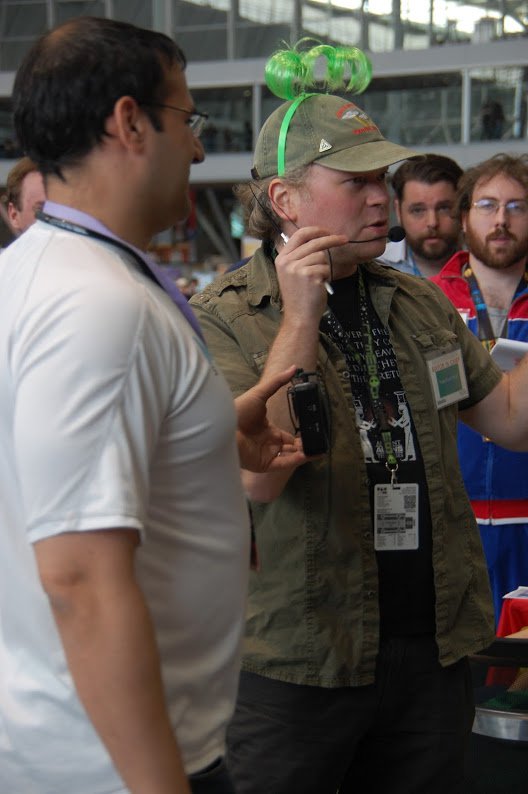When last we left the struggle between humanity and their would-be allies/enemies, Earth teetered on a knife edge. I personally wasn't convinced we'd done enough as the players to outwit the “bad” alien team. There were still too many problems and loose ends, and my gut told me this might not end happily for humanity. How did it all end, and perhaps more importantly what did it all mean? In this installment, I'll be exploring the finale and epilogue, plumbing the depths of the game's other dozen turns for that meaning, and getting to the bottom of this strange and wonderful thing we call Watch the Skies.
For those of you who need a quick summary of what Watch The Skies is: a 40-80 person large Role-Playing game, like Dungeons and Dragons, but with different groups representing different aliens and different human countries, fighting for survival. What can possibly go wrong? Some of the discussion in this part might be a little confusing if you haven't checked out Part 1.
The Beginning Of The End
Despite my misgivings in the first few rounds, it seemed other countries had in fact progressed farther technologically than our glorious Japanese nation. In the mess of the mid-game, amongst public unrest and alien attacks, we'd lost sight of our original goals. Global crisis and world solidarity had taken precedence over tech trees and rolling dice to see how advanced we could become. Perhaps this in itself constituted something of a “failure to win” for our team, or perhaps that was my own fault as Prime Minister, whose role centered around talking and roleplay rather than chucking dice across a table. My chief scientist would probably have disagreed with me on the importance of dice and the budget money, had I interviewed him prior to writing this. It's a credit to the game's designers that the players are offered multiple avenues of “defense” against the problems they face; they can opt for a more game-centric approach, in which they allocate resources towards a cause, but they can also diplomatically work or manipulate the other factions to get help (though perhaps this comes with a heavier roleplay cost). We had opted to spend our resources on a modest amount of technological progress, mainly in a balanced approach across the provided tech-tree, while other nations had honed in like lasers in one or two fields. As a result, our end-game tech was considerably weaker than other nations, though we were in strong diplomatic and global standing. Rallying the world behind speeches, as we'd grown accustomed to doing, we also did what we'd learned to do best: turn to our allies for the other half of the tech power that would lead us through. Specifically, we turned to Germany.
Germany, you see, had developed something of an “ark” with their research program: a giant space-faring vessel capable of taking a portion of humanity away to safety while we mastered our new-found super powers, regrouped, and came back to retake what was a turning into a lost cause on Earth. I, along with several other world leaders and some of the human populace, loaded into the ark and left our deputy heads of state in command of our nations. Eventually, hopefully we would win this war for everyone.
And that is where the game ended. Remember that a game like Watch the Skies could, like your weekly Dungeons & Dragons sessions, go on indefinitely. So, once the final turn timer has expired, the game masters ask the player teams for a synopsis of their actions for the future and construct an epilogue with which to close the game.

The aliens were here, and our final votes were cast. Could we live? Or would we die?
Both Success, and Hilarious Failure
So how did it end, and what did it all mean? Here's a quick recap of the epilogue that rounded out our game: the latest spin-off of the hit cosmic show “Real Planets” was a huge success (congrats to the alien team players on their “victory”). For its participation, Earth had earned about 1/10th of the credits it would need to apply for entry into the universal alliance of which our aliens were just a small part. In the mean time, Earth would be designated a protected natural preserve and left alone to develop. Yes, the entire alien threat that we had all been panicking about all damn game had been nothing more than a staged crisis for galactic entertainment. As for those of us on the Ark? Since we weren't around to hear the announcement, we were unaware of this development and would be fighting for our very survival on an inhospitable wilderness world during the highly anticipated second season of the show. We had become the cliff-hanger for a TV show.
The alien faction players delivering this message during the epilogue wore triumphant grins. With their secret objectives accomplished, they finished the game with top marks. If anyone could be considered winners, it was have been them. Many of the human players faces, on the flip side, carried a mix of confusion, dissapointment and amused smirks. As a final cap to the epilogue, events on Earth were wrapped up. Under the announcement that the alien struggle had been part of just a cosmic entertainment show, the one-earth government soon collapsed and old rivalries between nations once again ensued. Germany, as a bonus with the development of its Ark, went on to a promising future in space and would lead humanity into the stars. It was a bittersweet ending to an otherwise epic day of gaming.

Our UN representative, trying to keep the peace. The peace had worked, but was it all worth it?
Pulling Back The Curtain - Why Play Watch The Skies?
I had a chance to pass some emails back and forth with the Watch the Skies head game master, Noam Strassfeld, following the events of the day. Always open to feedback and genuinely one of the nicest guys I've ever met, he let the players know that if we had any feedback we were always welcome to pass it along to him. While I thought the game went very smoothly and told an amazing story, I took some issue with the epilogue. He was very open to the critiques and we had a very productive, brief discussion on the meaning of Watch the Skies and how future games could benefit from our experience.
Watch the Skies is more than just the biggest roleplaying game you'll ever play. It's ever-evolving and changing. Much like the mantra behind Star Trek, it seeks to better itself with each iteration, exploring what it means to be human and what humanity would do in the face of an unknown force as massive as a worldwide alien encounter. The aliens, while a player faction in themselves, are something of a catalyst for the story, pushing Earth out of its stale self-centeredness and into the unknown. You may be reading this and thinking, “how can a simple epilogue encapsulate the entirety of this experience that is a day spent playing one of these games?” Good question. I'm glad you asked!
The short answer is: it can't. A day spent gaming can be anywhere from six to ten hours of play. That day is broken into half hour turns, each turn representing weeks, months, or even years in game. No pun intended, but the sky is the limit in terms of player aspirations in these turns. They can achieve anything they can realistically grab for. If a die roll doesn't exist, the game staff will make one up and factor in any appropriate modifiers. As an example of the way a game can spiral out the game-master's control, we were told that in another game of Watch the Skies there were huge player-controlled corporations (one of the non-nation factions, like the media groups in our game). Behind the scenes, they decided in their game to band together in a sort of shadow corporation, use alien tech to develop a deadly virus, then hold the world hostage for a huge ransom (and the cure). It worked, and Earth progressed into a dystopian future ruled by megacorporations. A bit dark, but a great story and an epic experience to be a part of. Again, all of this is hard to wrap up in a five minute epilogue.

One of the disadvantages of epilogues is that they can feel a bit forced. The players spend several hours crafting a story together, but if they don't achieve “escape velocity” on some of their concepts, they risk their stories being pulled back into the realm of and-then-things-returned-to-the-way-they-were. While this may be somewhat logical, it can leave the players with a feeling of defeat. When this happens during a 1-hour board game, it's no big deal; you reset the pieces and play another game with your friends. But as the time spent playing increases, so does the need for both continued engagement, and then pay-off. In the case of our own game, I found the collapse of the one-earth government particularly poignant, especially as countries like China and Russia dropped old rivalries with counties like the US and Japan. I wondered as a player, and as a human being, if such a wondrous new creation would be thrown so lightly aside. Lets put aside that this all took place before actual world events like Brexit: I saw in this game how all the nations of the world stood together in the face of extinction, the way a communist nation launched its nukes in defense of a Western rival. The way humanity took to the stars as one race, the human race, was the greatest achievement of our narrative. To see it die in a five minute epilogue made me more disappointed than any news about the ill fate of my head of state character.
Looking To The Future - What Watch The Skies Strives For
The feedback wasn't all doom and gloom, though. Each of my concerns had a pointed response from Noam that lifted my spirits in turn. In our discussion, he mentioned several constraints that the Watch the Skies crew would be more conscious of the in the future. Not the least among them was the time concerns of playing at PAX; the game had to end by a certain time as that's when the expo floor, where we were playing, closed. Epilogues are meant to be more than a five minute ordeal. The game masters typically construct much more in-depth closure for each nation, custom tailoring the ending to the players in a much more grand way than was done at PAX. They also discussed allowing the goals for each nation to be more broad-sweeping, yet still strong, allowing a great likelihood of achieving that “escape velocity” throughout their actions. Or at the very least, not falling back to a point of no progress. In other words, every player should be left with some feeling of accomplishment in the collective narrative.
This game of Watch the Skies was also an attempt to tell a more “lighthearted” story. I use massive quotes here, because for most of the game's participants, the crisis is still perceived as one of fighting extinction. This mismatch of tone was Noam's other point of concern leading into the awkward ending epilogue: one side fighting had been fighting for their very survival, while the other is filming a television show. I actually applaud the Watch the Skies staff for attempting this, as it shows their dedication to pushing the form of this game and the stories it's capable of telling. I mean, how many different ways can you frame the story of “and then a potentially hostile alien force showed up on earth?” I wouldn't say that the experience was a failure by any stretch, because the day-long game was still an amazing narrative that I would definitely do again. That's not something to toss so easily aside. Noam related to me that he's considering taking the alien side of this scenario to a possibly darker direction to better match the tone across all sides. He might even scrap that particular scenario if it's not just not as viable.
One really important take away I got was that Watch The Skies is an experiment, always in motion: for us as players, we are trying to solve our own troubles and a collective mystery. For Noam and the game-makers, they are trying to make the most interesting and engaging game they can, every time they set up for one of these colossal events. It's nothing to sneeze at, and I applaud the people behind this massive game.

Watch The Skies Is An Experience, And One Worth Having
All in all, I would still wholeheartedly recommend playing a game of Watch the Skies if you ever get the opportunity. I've said it in other articles, like how fun it is to make characters in XCOM2: that humans are hard-coded creatures of imagination. We crave story. Therein lies the greatest strength of a game as huge and wondrous as Watch the Skies. If your weekly pen-and-paper game session is fun with just a group of a half dozen of your friends, imagine what kind of time you could have playing with 60 or more fellow story lovers. The idea of a ten or fifteen minute epilogue definitely can be jarring, compared to the ongoing sessions of a normal tabletop game, but don't lose sight of the hours of fun and intensity that a megagame like this packs in: it's the journey that makes the experience worthwhile. It's all about that narrative we lovingly create during the stress of the game. And from what I've seen, both the US and UK-based megagame societies do a wonderful job of smoothly running what could just be the most epic RPG you ever play.
If you're interested in learning more about events near you, check out the Megagame Society's facebook page for a listing. Even though my own experience had a few down moments, the hours of fun more than made up for it beforehand. For my part, I'm looking to see when they might be coming to New York next.
If you like our content, please leave a comment below. We'd love to hear your thoughts! If you really like our content, please follow us on Facebook or Twitter. And if you really, really like our content, feel free to check our our Patreon: us fake world leaders need to pay the bills somehow.